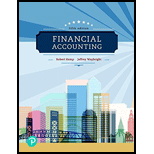
Financial Accounting
5th Edition
ISBN: 9780134728643
Author: Robert Kemp; Jeffrey Waybright
Publisher: Pearson Education (US)
expand_more
expand_more
format_list_bulleted
Concept explainers
Question
Chapter 7, Problem 1WC
To determine
Prepare an e-mail to the owner of Incorporation HA explaining the situation and requesting the payment for the entire amount due, including the return check charge.
Expert Solution & Answer
Want to see the full answer?
Check out a sample textbook solution
Students have asked these similar questions
What is the overhead rate for Department A on these general accounting question?
Babu Company completes job #928 which has a standard of 610 labor hours at a standard rate of $19.30 per hour. The job was completed in 590 hours and the average actual labor rate was $19.10 per hour. What is the labor rate variance?
Need help with this financial accounting question
Chapter 7 Solutions
Financial Accounting
Ch. 7.A - Prob. 1SECh. 7.A - Prob. 2SECh. 7.A - Prob. 3AECh. 7.A - Prob. 4AECh. 7.A - Prob. 5BECh. 7.A - Prob. 6BECh. 7.A - Prob. 7APCh. 7.A - Prob. 8BPCh. 7 - Which duties should be segregated in the...Ch. 7 - Prob. 2DQ
Ch. 7 - Prob. 3DQCh. 7 - Why does the allowance method of accounting for...Ch. 7 - Prob. 5DQCh. 7 - Prob. 6DQCh. 7 - Prob. 7DQCh. 7 - How would the net realizable value of Accounts...Ch. 7 - Prob. 9DQCh. 7 - Prob. 10DQCh. 7 - Prob. 1SCCh. 7 - Prob. 2SCCh. 7 - Prob. 3SCCh. 7 - Prob. 4SCCh. 7 - Prob. 5SCCh. 7 - Prob. 6SCCh. 7 - Prob. 7SCCh. 7 - Prob. 8SCCh. 7 - Prob. 9SCCh. 7 - Prob. 10SCCh. 7 - Prob. 11SCCh. 7 - Prob. 12SCCh. 7 - Prob. 1SECh. 7 - Prob. 2SECh. 7 - Prob. 3SECh. 7 - Prob. 4SECh. 7 - Prob. 5SECh. 7 - Prob. 6SECh. 7 - Prob. 7SECh. 7 - Prob. 8SECh. 7 - Prob. 9SECh. 7 - Prob. 10SECh. 7 - Prob. 11SECh. 7 - Prob. 12SECh. 7 - Prob. 13SECh. 7 - Prob. 14SECh. 7 - Prob. 15SECh. 7 - Quick ratio (Learning Objective 7) 510 min....Ch. 7 - Prob. 17SECh. 7 - Prob. 18AECh. 7 - Prob. 19AECh. 7 - Prob. 20AECh. 7 - Prob. 21AECh. 7 - Prob. 22AECh. 7 - Prob. 23AECh. 7 - Prob. 24AECh. 7 - Prob. 25AECh. 7 - Prob. 26AECh. 7 - Prob. 27AECh. 7 - Quick ratio and current ratio (Learning Objective...Ch. 7 - Prob. 29AECh. 7 - Prob. 30BECh. 7 - Prob. 31BECh. 7 - Prob. 32BECh. 7 - Prob. 33BECh. 7 - Prob. 34BECh. 7 - Aging of accounts receivable allowance method...Ch. 7 - Prob. 36BECh. 7 - Prob. 37BECh. 7 - Prob. 38BECh. 7 - Prob. 39BECh. 7 - Quick ratio and current ratio (Learning Objective...Ch. 7 - Prob. 41BECh. 7 - Prob. 42APCh. 7 - Prob. 43APCh. 7 - Prob. 44APCh. 7 - Prob. 45APCh. 7 - Prob. 46APCh. 7 - Accounting for notes receivable (Learning...Ch. 7 - Prob. 48APCh. 7 - Prob. 49BPCh. 7 - Prob. 50BPCh. 7 - Prob. 51BPCh. 7 - Prob. 52BPCh. 7 - Prob. 53BPCh. 7 - Prob. 54BPCh. 7 - Prob. 55BPCh. 7 - Continuing Exercise In this exercise, we continue...Ch. 7 - Prob. 1CPCh. 7 - Prob. 1CFSAPCh. 7 - Prob. 1EIACh. 7 - Prob. 2EIACh. 7 - Financial Analysis Purpose: To help familiarize...Ch. 7 - Industry Analysis Purpose: To help you understand...Ch. 7 - Prob. 1SBACh. 7 - Prob. 1WC
Knowledge Booster
Learn more about
Need a deep-dive on the concept behind this application? Look no further. Learn more about this topic, accounting and related others by exploring similar questions and additional content below.Similar questions
- Quick answer of this accounting questionsarrow_forwardRiverbend Earthworks Inc. purchased a used Komatsu PC210 excavator for $600,000 in January 2018. The company estimates the equipment's useful life to be 12 years and the salvage value to be $80,000. Using straight-line depreciation, calculate the depreciation expense for 2018, the first year of the equipment's life, and determine the equipment's net book value at December 31, 2020, after the third year of the equipment's life. (Round your calculation to nearest number for Accumulated depreciation part if needed)arrow_forwardDon't use ai given answer accounting questionsarrow_forward
- Silver Creek Technologies has the following financial information: please answer the financial accounting questionarrow_forwardThe per-unit standards for direct labor are 2 direct labor hours at $15 per hour. If in producing 2,300 units, the actual direct labor cost was $68,800 for 4,300 direct labor hours worked, the total direct labor variance is____? I want Solutionarrow_forwardThe actual cost of direct materials is $48.25 per pound, while the standard cost per pound is $50.75. During the current period, 4,800 pounds were used in production. What is the direct materials price variance?arrow_forward
arrow_back_ios
SEE MORE QUESTIONS
arrow_forward_ios
Recommended textbooks for you
 Financial Accounting: The Impact on Decision Make...AccountingISBN:9781305654174Author:Gary A. Porter, Curtis L. NortonPublisher:Cengage Learning
Financial Accounting: The Impact on Decision Make...AccountingISBN:9781305654174Author:Gary A. Porter, Curtis L. NortonPublisher:Cengage Learning Cornerstones of Financial AccountingAccountingISBN:9781337690881Author:Jay Rich, Jeff JonesPublisher:Cengage Learning
Cornerstones of Financial AccountingAccountingISBN:9781337690881Author:Jay Rich, Jeff JonesPublisher:Cengage Learning Financial AccountingAccountingISBN:9781337272124Author:Carl Warren, James M. Reeve, Jonathan DuchacPublisher:Cengage Learning
Financial AccountingAccountingISBN:9781337272124Author:Carl Warren, James M. Reeve, Jonathan DuchacPublisher:Cengage Learning

Financial Accounting: The Impact on Decision Make...
Accounting
ISBN:9781305654174
Author:Gary A. Porter, Curtis L. Norton
Publisher:Cengage Learning

Cornerstones of Financial Accounting
Accounting
ISBN:9781337690881
Author:Jay Rich, Jeff Jones
Publisher:Cengage Learning

Financial Accounting
Accounting
ISBN:9781337272124
Author:Carl Warren, James M. Reeve, Jonathan Duchac
Publisher:Cengage Learning
